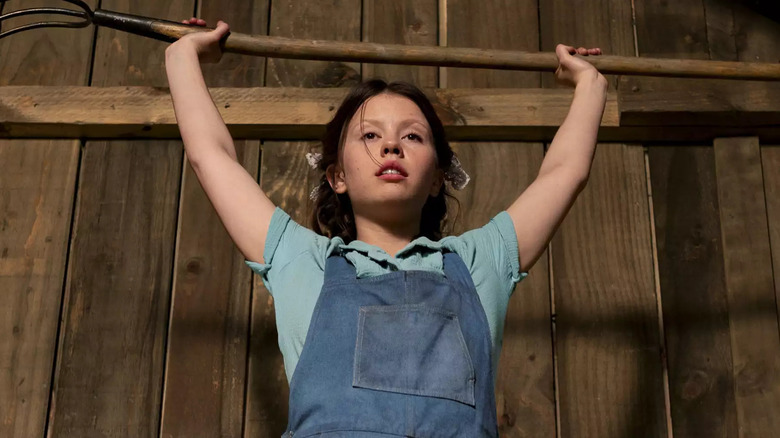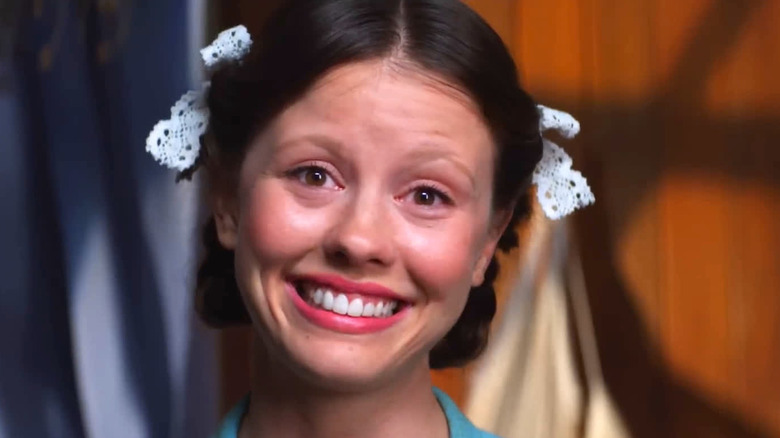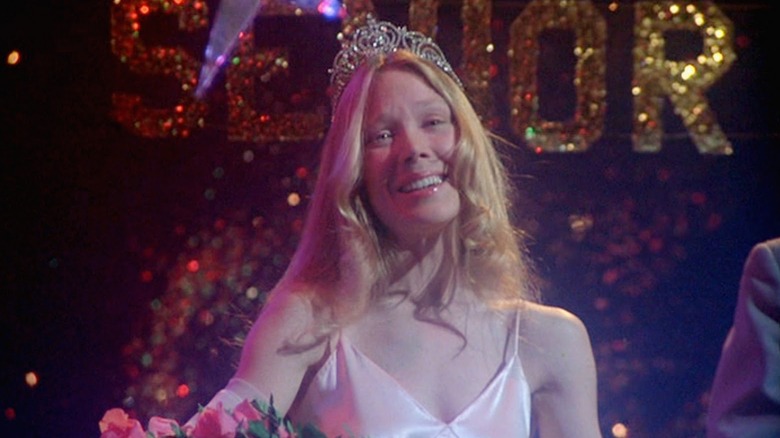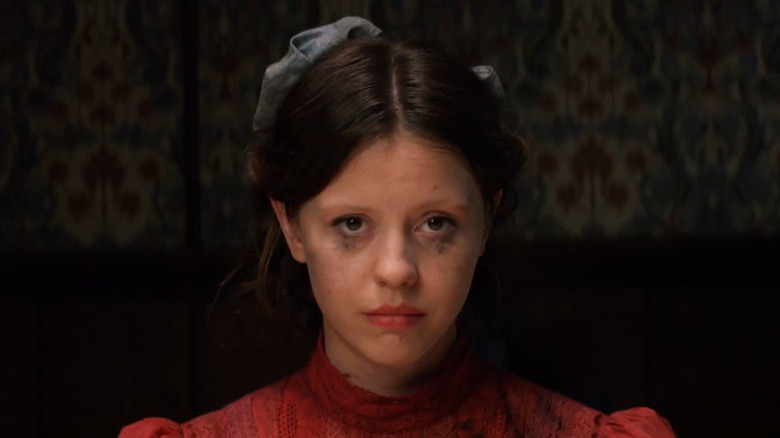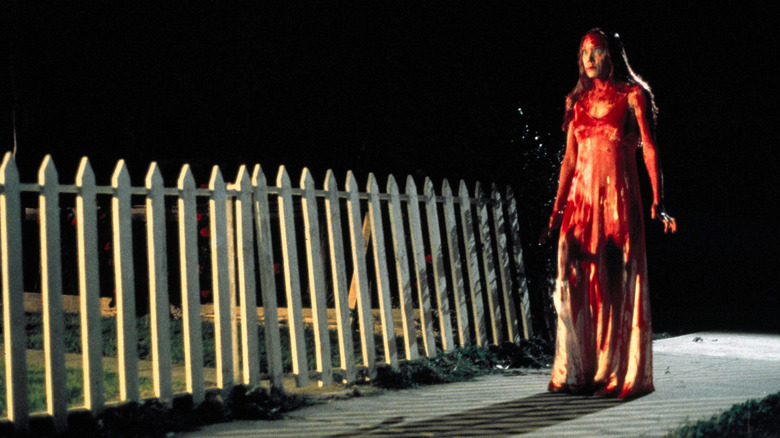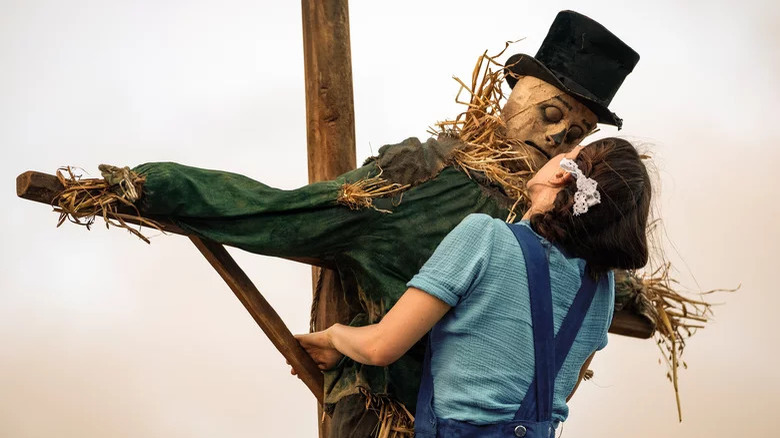What Pearl Has In Common With One Of Stephen King's Greatest Characters
Ti West's new psychological horror film "Pearl" is out in theaters, and it's definitely worth a watch. It's about a sweet young woman named Pearl (Mia Goth) who wants to be a famous actress, and she'll stop at nothing to make that happen. If Pearl was growing up today she'd probably rise to fame as a chaotic TikTok star, but unfortunately she's stuck in 1918: There's still a pandemic going on, but there's not even any internet to help pass the time. Can you really blame her for going a little off the rails?
The obvious parallel that comes to mind with "Pearl" is the beloved classic "The Wizard of Oz." Not only did Ti West embrace the vibrant technicolor look of the old movie, but Pearl's motivations are remarkably similar to Dorothy's: She wants to get off this miserable old farm. Both movies also memorably feature a scarecrow, and they both end with the protagonist returning to the farm they originally wanted to get away from. It's just that for Pearl, returning home isn't exactly a happy ending.
But when watching "Pearl," one can't help but be reminded of another classic movie, one that came out in the '70s instead of the late '30s: "Carrie." The famous adaptation of Stephen King's debut novel may not play out in quite the same way as "Pearl," but man, there are a lot of similarities.
Spoilers ahead for "Pearl."
Mother issues
Both Pearl and Carrie White (Sissy Spacek) are deeply lonely people who feel isolated from the rest of their peers. For Carrie, the isolation is mainly because she's socially awkward and her aggressively religious mother (Margaret White, played by Piper Laurie) won't let her do anything that might help make her high school experience a little easier.
A lot of Pearl's isolation is also due to her mother: Ruth (Tandi Wright) refuses to support Pearl's dreams of becoming an actress, nor does she allow Pearl to spend much time away from the farm in general. In the dinner scene where Pearl begs Ruth to let her go to the dance audition, it feels like a mirror image of the scene where Carrie asks her mother to let her go to the prom. With both scenes, the mother tells her daughter not to go, and promises that nothing good will come of it.
Margaret White is correct when she says that everyone's gonna laugh at Carrie, just as Ruth is right that Pearl is never going to be successful as a famous actress (mostly on account of Pearl's thinly veiled psychopathic tendencies). Despite that, it's hard not to take the daughter's side in these scenes, to not root for them as they disobey their strict parents. There is something satisfying about Pearl telling Ruth she doesn't want to end up like her, even though we know Pearl will end up even worse.
False hope
Perhaps the biggest similarity is the way so much of the tragedy in these films are the result of an attempted act of kindness. "Carrie" revolves around her classmate Sue (Amy Irving) trying to make amends to Carrie by having her boyfriend Tommy (William Katt) take Carrie to the prom. It's a genuinely nice gesture, one Sue never would've made if she'd known the chain of events that would follow. A lot of characters in "Carrie" realize they've mistreated the girl and try to make things right, which only makes the successful prank at the end all the harder for Carrie to cope with.
If Carrie's classmates had all kept treating her like an outcast, they probably would've been fine. But they gave her a taste of what it was like to be accepted before it was taken away, and most of them didn't survive the aftermath. Likewise, as much as Pearl probably would've murdered her parents at some point, she doesn't really start to spiral until she learns of the dance audition. Pearl's sister-in-law Mitzy (Emma Jenkins-Purro) thinks she's being nice by telling Pearl about the audition, but dangling hope in front of her like that is quite possibly the worst thing she could do.
It's also hard not to see echoes of Tommy in the projectionist character (David Corenswet). He's a bit of a sketchy guy, but is enough of a gentleman to want to make sure Pearl gets home safely, which gets him killed. It's also easy to see parallels between Sue Snell and Mitzy; both characters try to be nice, but they have no idea what they're dealing with until it's far too late.
When kindness backfires
The most quietly chilling part of "Pearl" is when Mitzy tells Pearl to go ahead of her for the audition. In the moment, it seems like Mitzy is genuinely too nervous, or she's trying to be nice. But if Mitzy had auditioned first, if she hadn't asked Pearl to switch spots with her, Pearl would've seen her walking out rejected. When Mitzy later says she didn't get the part, Pearl would know she isn't lying. But because Pearl goes first and the casting directors mention wanting a blonde girl, Pearl convinces herself Mitzy got the part, even after Mitzy denies it. As she tries to leave Pearl's house, you can see the gears working in Pearl's head: if she's lying about getting the part, she's probably lying when she says she'll keep quiet about all of Pearl's murders.
When rewatching "Carrie," we can't help but always hope things will turn out differently, that maybe this time Chris Hargensen (Nancy Allen) will back out of the prank at the last moment. Watching "Pearl" — especially with the foreknowledge "X" gives us — creates the same futile feeling: even though we know they won't, we hope the casting directors will accept Pearl. On rewatch we hope that maybe this time the projectionist will simply let Pearl walk home by herself, or maybe Mitzy won't ask Pearl to take her place in line.
It's painful to watch these characters unknowingly put their lives in danger in a misguided attempt to be nice, even though it makes sense. After all, Pearl and Carrie are characters who seems helpless and harmless from the outside looking in; Sue and Mitzy try to be nice to her because they want to be good people, not because they're afraid for their own safety.
The key difference
The point where the films diverge is with the agency of their main character. Even when Carrie White snaps and goes on a murder rampage, it never really feels like we're expected to consider her accountable for her actions. Carrie was a good person who simply snapped under the pressure of extreme emotional abuse. Her murder rampage feels like a tornado going through the town rather than an actual person making a series of bad choices.
Pearl, meanwhile, is far less sympathetic. She's treated poorly, sure, but she's mostly suffering from a hell of her own making. Her audition scene is treated with a similar level of gravity as Carrie's coronation scene — there's the slow motion, the glimpse of happiness, the moment where all her hopes are dashed — but nobody's actually out to get Pearl. The casting directors aren't being particularly mean when they reject her; they're simply being honest about what they're looking for and dealing frankly with the reality that they'll have to reject most of the girls trying out.
Even Pearl's mother isn't really being overly mean to her, at least nowhere to the extent of Margaret White. Ruth may be strict, but she's right about her daughter being unwell and she has good reasons to want Pearl to focus on helping out at home. Yes, Ruth's parenting skills leave a bit to be desired, but she has far more reason to be the way she is than her "Carrie" counterpart.
A difference in focus
Pearl snaps because she put all her hopes on this one audition, not seeming to appreciate that even the most talented performers still have to deal with lots of rejection early in their career. While it's easy to imagine Carrie turning out okay if the world had simply been kinder to her from the start, it's not clear at all where Pearl's entitlement and unearned egotism would've landed her in another time or place.
It's a change that makes Pearl far less sympathetic, but also one that makes her a more overall compelling character. Pearl is more layered, much harder to make sense of, which fits for the story the movie's trying to tell. After all, while Carrie may technically be the main character of her movie, it's Sue and Chris' decisions that mostly drive the plot. Carrie doesn't need to be as fleshed out for her story to work, but Pearl does.
At its core, "Carrie" is a critique of a community that fails to do right by a kid and gets punished for it. It's got a relatively clear-cut message it wants to tell, and it does so effectively. While "Pearl" certainly has some social critiques to make, it's a character study above anything else. It takes us into the mind of a uniquely troubled young woman, giving us a glimpse of how she ended up as the old lady in "X" while still leaving some threads open-ended. As to what message you're supposed to take away from Pearl's origin story? The movie leaves that up to you to decide on your own, and that's probably for the best.
